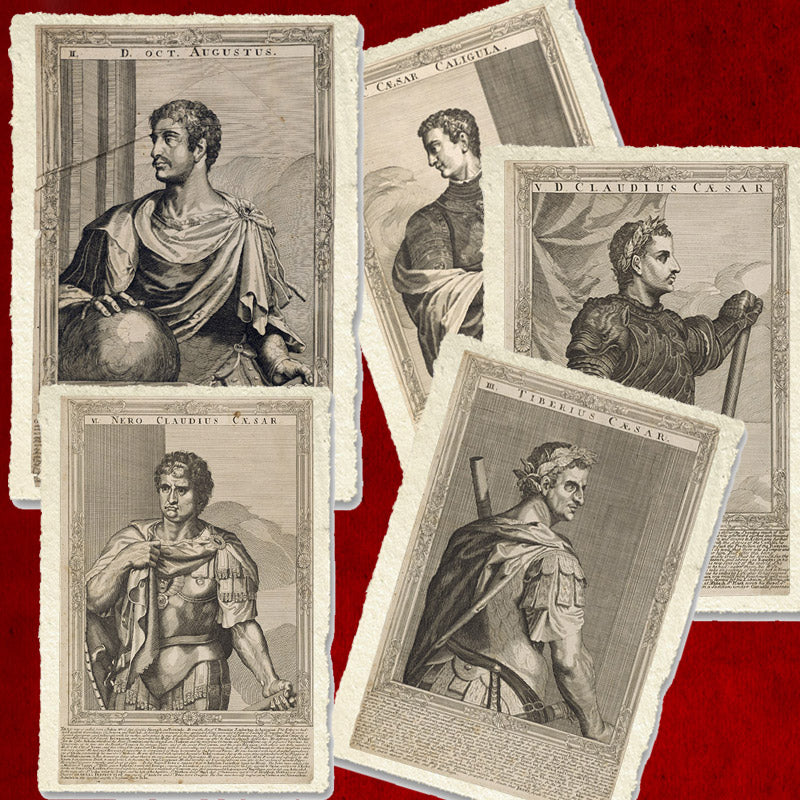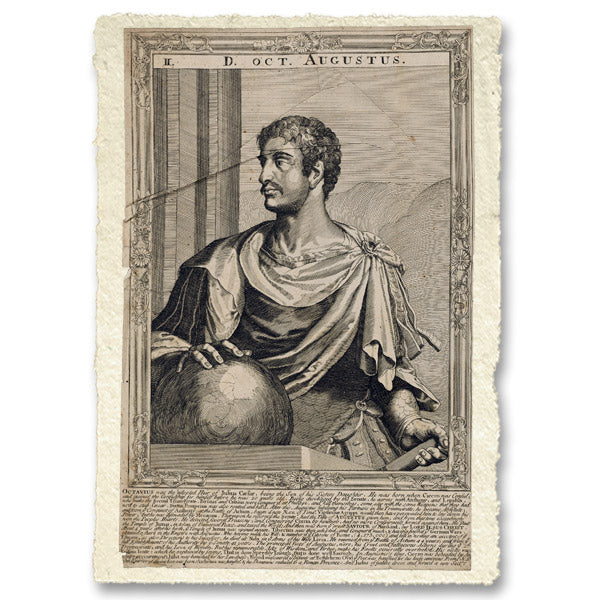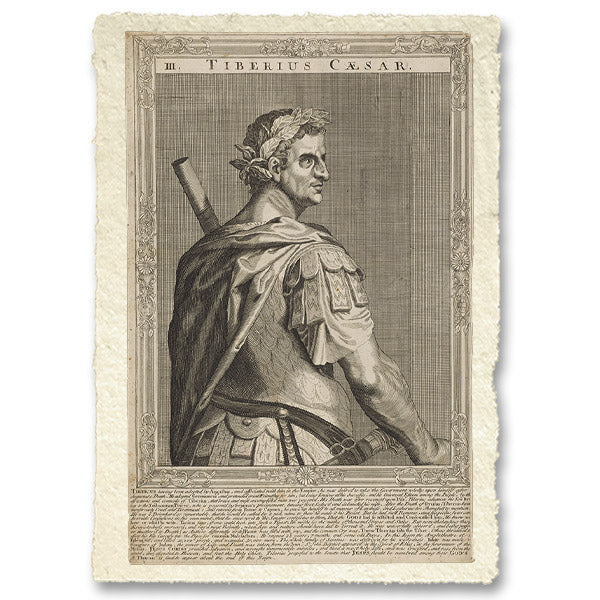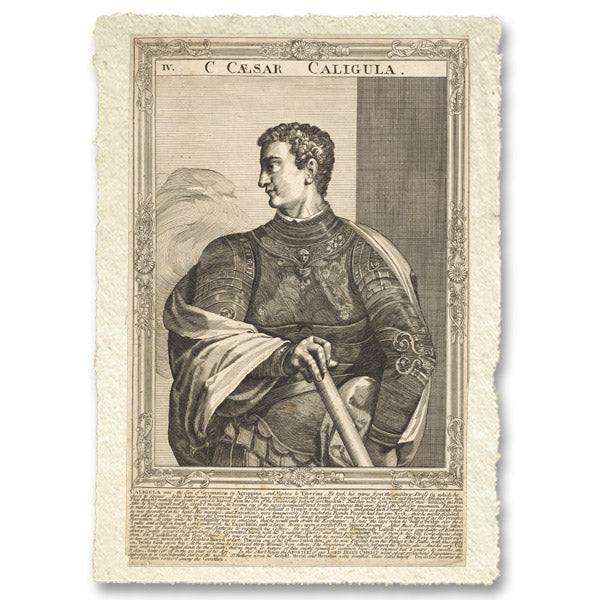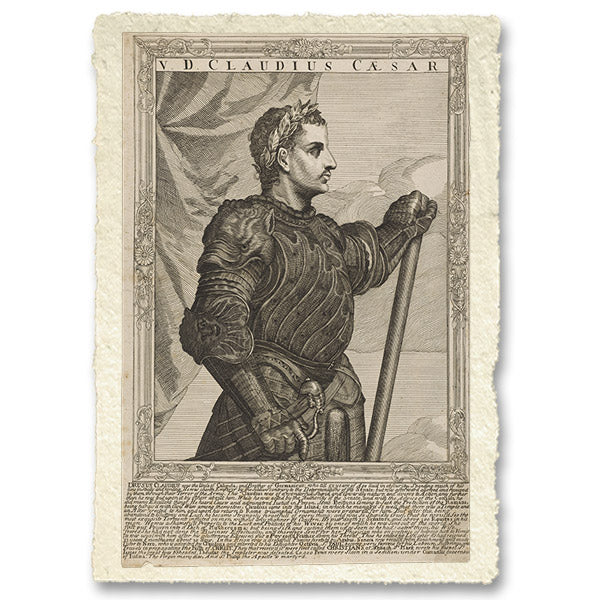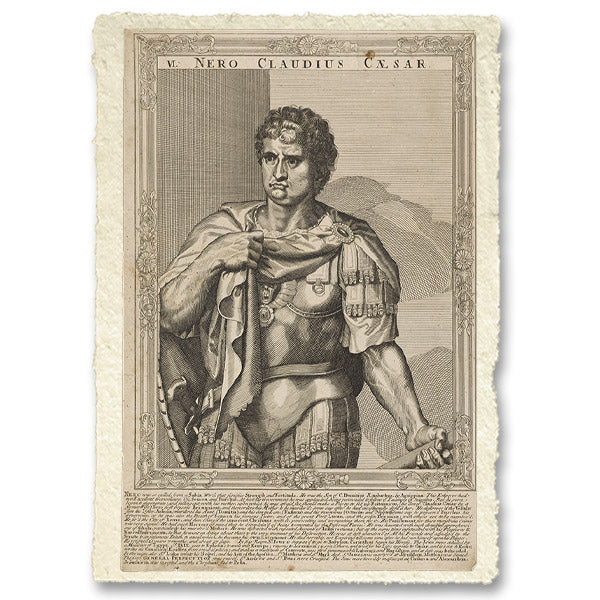1
/
of
8
Collection of Emperors of the Julius Claudia dynasty. Sadler's 5 Emperors
Collection of Emperors of the Julius Claudia dynasty. Sadler's 5 Emperors
Regular price
€290,00 EUR
Regular price
Sale price
€290,00 EUR
Unit price
/
per
Taxes included.
Shipping calculated at checkout.
Couldn't load pickup availability
SKU:KW4PX2WIO4M60-1
Share product on social media
The collection
The Julio-Claudian dynasty includes the first five Roman emperors: Augustus, Tiberius, Caligula, Claudius and Nero.
This line of emperors ruled the Roman Empire from its formation under Augustus in 27 BC until the last of the line, Emperor Nero, committed suicide in 68 AD.
The name Julio-Claudia is a historiographical term, deriving from the two families that made up the imperial dynasty: the Julii Caesares and the Claudii Nerones.
Julius and Claudio were two Roman surnames, in classical Latin. Roman surnames were inherited from father to son, but a Roman aristocrat could, during his lifetime or in his will, adopt an heir if he lacked a natural son. In accordance with Roman naming conventions, the adopted son replaced his original surname with the name of his adoptive family. A famous example of this custom is Julius Caesar's adoption of his great-grandson, Gaius Octavius.
Primogeniture is notably absent in the history of the Julio-Claudian dynasty. Augustus, Caligula, and Nero failed to produce biological, legitimate children . Tiberius' own son, Drusus, died before him. Only Claudius survived his son, Britannicus, although he chose to promote his adopted son Nero as his successor to the throne. Adoption eventually became a tool used by most Julio-Claudian emperors to promote their chosen heir to the succession front.
Augustus (Imperator Caesar Divi Filius Augustus), as Caesar's adopted son and heir, discarded his natural father's surname and initially renamed himself "Gaius Julius Caesar" in honor of his adoptive father. It was also customary for the adopted child to acknowledge his original family by adding an extra name to the end of his new name. As such, the name Augustus adopted would have been "Gaius Julius Caesar Octavian".
After the ascension of Augustus as the first emperor of the Roman Empire in 27 BC, his family became the de facto "Julio-Claudian dynasty" in historiography. For various reasons, the Julio-Claudians followed the example of Julius Caesar and Augustus in using adoption as a tool for dynastic succession. The next four emperors were closely related through a combination of blood kinship, marriage, and adoption.
Tiberius (Tiberius Caesar Divi Augusti Filius Augustus), a Claudian by birth, became Augustus' stepson after the latter's marriage to Livia, who in the process divorced Tiberius' natural father. Tiberius's connection with the Julian side of the imperial family was strengthened when he married Augustus' only daughter, Julia the Elder. He eventually succeeded Augustus as emperor in 14 AD after becoming his stepfather's adopted son and heir.
Caligula (Gaius Julius Caesar Augustus Germanicus) was born into the Julian and Claudian branches of the imperial family, thus making him the first true "Julio-Claudian" emperor. His father, Germanicus , was the son of Nero Claudius Drusus and Antonia Minor, son of Livia and daughter of Octavia Minor respectively. Germanicus was also the great-grandson of Augustus on his mother's side and nephew of Tiberius on his father's side.
Claudius (Tiberius Claudius Caesar Augustus Germanicus), Germanicus' younger brother, was a Claudian on the side of his father, Nero Claudius Drusus, Tiberius' younger brother. However, he was also related to the Julian branch of the imperial family through his mother, Antonia Minor. As Antonia's son, Claudius was Augustus' great-grandson.
Nero (Nero Claudius Caesar Augustus Germanicus) was a great-grandson of Augustus and Livia through his mother, Agrippina the Younger. The young Agrippina was the daughter of Germanicus and Agrippina Major, as well as sister of Caligula. Through his mother, Nero was related by blood to the Julian and Claudian branches of the imperial family. Within a year of Nero's suicide in 68 AD, the Julio-Claudian dynasty was succeeded by the Flavian Emperors after a brief civil war over the vacant imperial throne.
How reproductions are made
The craftsmen of Trizio Editore make a reproduction of this subject with a unique mechanism . The image is in fact printed several times as a test, until the correct combination of color tones is found. Finally, a professional 12-color inkjet printer creates a perfect copy, which is double-checked by hand and left to dry in protected environments. The artisans use a natural fixative to preserve the shine and sharpness of the image and package the product entirely by hand. Appreciated and used today by true connoisseurs of quality, fine papers, very fine photographic papers or pictorial canvases have an ancient tradition. Symbol of Made in Italy recognized throughout the world, these extremely refined prints represent priceless subjects that come to life in a new light. When printing is carried out, it passes to drying which in protected environments and with precise temperature and humidity helps the colors to remain vivid and full-bodied. The following fixing serves to keep the colors as just done forever. In fact, the fixer comes directly into contact with the surface and creates a real physical barrier between the colors and dust or bad weather. The choice of frames and brilliant glass is then a delicate and precise design step . The colors each have their own peculiarity. With natural elements, we have special frames with incredible brilliance and lightness. The matching of the frames is clearly done depending on the subject. To help us in the choice , art experts and painting masters carry out tests and tell us which choice to make. All reproductions are chosen and followed by our Italian artisans.